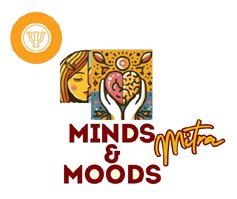Escaping the Spiral: A Guide to Negative Thinking 🌪️
Negative thinking is a common mental habit characterized by a pessimistic or critical outlook on oneself, others, and life’s events. While occasional negative thoughts are normal, a persistent pattern of them can lead to a cycle of distress and self-sabotage. A psychotherapist or mental health counsellor can provide effective strategies to help individuals break this cycle, and it is often a core focus in personal counselling and personality development counselling.
A Trusted Professional in Nagpur: Rrimi Bodalkar
For those in Nagpur, Rrimi Bodalkar, a Sr. Psychotherapist / Mental Health Counsellor, is a highly qualified professional with expertise in treating negative thinking. With her M.A. in Psychology (Counselling) and PGDMH (Clinical), she has a strong foundation in a wide range of therapeutic practices. Her specialization in CBT, REBT & DBT (Specialised) makes her particularly adept at helping clients address the core thoughts and behaviors that drive their negative mindset. As an NSDC Certified professional in Psychometric Analysis & Learning Style Assessment, she is well-equipped to provide a holistic approach to your concerns, from confidence building to personal counselling and career counselling.
When to Seek Help: Symptoms & Causes
It is important to recognize when negative thinking becomes a pervasive and harmful habit. The symptoms that may signal a need for professional help include:
- Pessimistic Outlook: Expecting the worst in every situation, even when there is no evidence to support it. This can often be an early sign of depression, and a skilled depression therapist can help.
- Self-Criticism: A constant inner voice that belittles one’s own efforts, abilities, and worth. This can erode confidence building and lead to a lack of motivation.
- Catastrophizing: Blowing small problems out of proportion, imagining worst-case scenarios, and believing that a minor setback is a total disaster.
- Avoidance & Social Withdrawal: Avoiding new opportunities or social interactions out of a fear of failure or judgment. This can negatively impact social skills training and lead to feelings of loneliness.
- Physical Symptoms: Experiencing workplace stress, headaches, fatigue, and other physical manifestations of mental distress.
The causes of negative thinking can be varied. They may stem from childhood experiences, a history of trauma, or the development of ingrained cognitive biases. It can also be a symptom of an underlying mood disorder or a result of chronic burnout.
The Counselling Procedure: A Path to Cognitive Freedom
The procedure of treatment for negative thinking is highly effective and often involves a combination of therapeutic techniques.
- Awareness and Identification: The first step is learning to identify your specific negative thought patterns. A therapist may ask you to keep a thought journal to track your thoughts, feelings, and the events that trigger them.
- Cognitive Restructuring: This is the cornerstone of treatment. A psychologist will use a variety of techniques, such as those from Cognitive Behavioral Therapy (CBT) and Rational Emotive Behavior Therapy (REBT), to help you challenge and reframe these negative thoughts. For example, a thought like “I am a total failure” can be challenged by asking for evidence or considering a more balanced perspective.
- Behavioral Experiments: The therapist may encourage you to test your negative thoughts in real-world scenarios. This is a core part of Behavioral therapy. For example, if you believe you will fail at a task, you might be encouraged to try it and see if your prediction is true. This can be a key part of confidence building.
- Mindfulness & Acceptance: A professional may also use techniques from Dialectical Behavior Therapy (DBT) to help you observe your thoughts without judgment, rather than getting caught in a spiral.
- Long-Term Strategy: The goal of therapy is to equip you with the skills to manage negative thinking on your own. This can be vital in all aspects of life, from career counselling to relationship counselling.
Frequently Asked Questions (FAQ’s)
Q1: How is a negative thinking therapist different from a depression therapist?
A: A depression therapist specializes in the treatment of clinical depression, which often involves negative thinking. A therapist focused on negative thinking may help a wider range of clients, from those with low-grade pessimism to those with severe anxiety or other issues.
Q2: Can negative thinking affect my relationships?
A: Yes. A persistent negative mindset can lead to criticism of your partner, a lack of trust, and a tendency to find fault in every situation. Relationship counselling or marriage counselling often addresses these issues as a core problem.
Q3: Can a child psychologist help with a child’s negative thinking?
A: Yes. It’s common for children to develop negative thought patterns, and a child psychologist can use age-appropriate tools to help them reframe their thoughts and develop a healthier mindset.
Q4: Will a Personality assessment show if I am prone to negative thinking?
A: Yes. Many Personality assessment tools, such as the NEO-PI-R, have a “Neuroticism” or “Emotional Stability” scale that can provide insight into a person’s tendency to experience negative emotions and thought patterns.
Q5: Is it possible to completely stop having negative thoughts?
A: The goal is not to eliminate all negative thinking, which is often impossible. The goal is to reduce its frequency and power, so that it no longer controls your behavior or emotional well-being.

